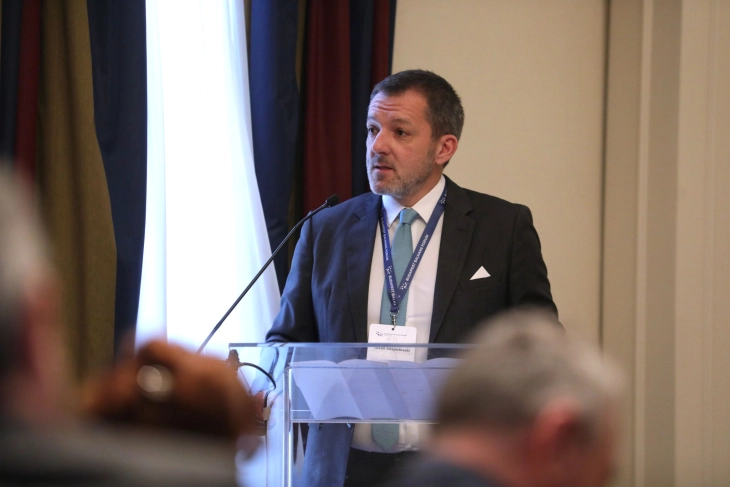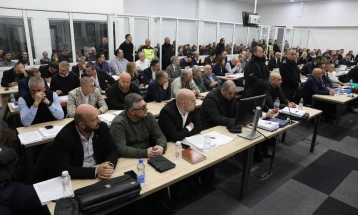Despotovski urges retaining local employees with higher wages instead of importing foreign workers
- Tackling the labour shortage in the Western Balkans requires a rational and courageous approach. Economic restructuring is needed, along with investment in technology and industries that generate higher added value and offer better-paid jobs, said Jovan Despotovski, CEO of the Technological Industrial Development Zones (TIDZ) at the 2024 Budapest Balkans Forum.

Skopje, 13 March 2024 (MIA) – Tackling the labour shortage in the Western Balkans requires a rational and courageous approach. Economic restructuring is needed, along with investment in technology and industries that generate higher added value and offer better-paid jobs, said Jovan Despotovski, CEO of the Technological Industrial Development Zones (TIDZ) at the 2024 Budapest Balkans Forum.
Despotovski, at the invitation of the Hungarian Institute of International Affairs, as being keynote speaker at the panel discussion titled ‘Workforce Wanted: Tackling Labour Shortage in Central and Southeast Europe,’ said that in addressing this current issue, it is crucial to view and analyze matters through a quantitative and structural approach to find effective solutions.
“The productivity gap between the countries in the region, as confirmed by statistics on productivity and GDP per capita, raises critical questions regarding workforce efficiency and sectoral distribution. Comparing Slovenia’s productivity with that of Macedonia, Serbia, and Albania reveals sharp contrasts. Despite similar population sizes, Slovenia demonstrates significantly higher levels of productivity. This raises the question of why the same number of people in Slovenia produce five times more than in Macedonia, or why the equivalent production in Serbia requires 3.5 times more people than in Slovenia,” Despotovski noted.
In his view, optimizing sectors and transferring workers can bring about the required change, for instance, by relocating workers from agriculture and traditional low-paying manufacturing activities, as well as from public administration to sectors in demand in the labor market.

In tackling labour shortages, foreign workers emerge as a quick solution to alleviate immediate pressures, Despotovski said. However, he noted that when employing foreign labour, it is crucial to consider cultural compatibility, language proficiency, and adaptability, along with technical skills.
“The concept of free movement of labour in Macedonia, Serbia, and Albania within the framework of the Open Balkans initiative has the potential to boost labour markets and foster economic growth. Facilitating greater synergy among these countries can accelerate their shared developmental path and bridge the gap with more advanced economies. By promoting sector redefinition, embracing foreign labour reasonably, and utilizing regional cooperation, we can pave the way for sustainable economic growth and prosperity across the Western Balkans,” Despotovski said.
According to the Technological Industrial Development Zones, the panel includes representatives from the German Eastern Business Association, the Vienna Institute for International Economic Studies, as well as professors from the Faculty of Economics in Belgrade and the Hungarian Oeconomus Economic Research Foundation.
2024 Budapest Balkans Forum is the flagship conference of the Hungarian Institute of International Affairs, bringing more than 100 experts, decision-makers, and policy-shapers from across the globe together in Hungary.
Hungary's Minister of Foreign Affairs, Péter Szijjártó, Serbia's Minister of Mining and Energy, Dubravka Đedović, Vesela Tcherneva, Deputy Director of the European Council on Foreign Relations, and Albania's Minister for Europe and Foreign Affairs, Igli Hasani, are among the participants of the event.
This year's two-day forum focuses on energy, economy, and EU integration of the Western Balkans. The Budapest Balkans Forum is being held for the eighth consecutive year.
Photo: TIDZ







